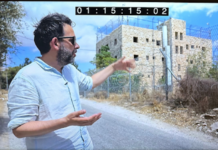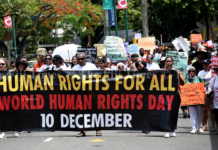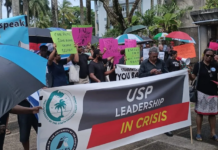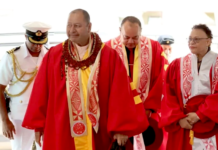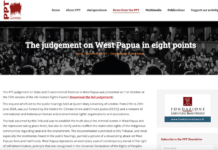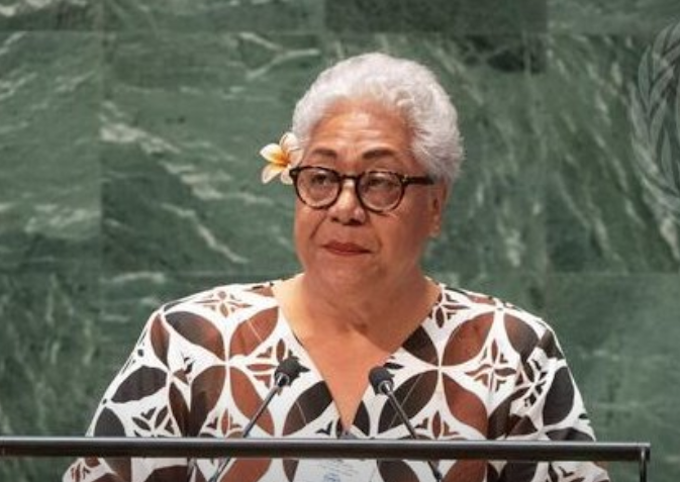
By Pita Ligaiula of Pacnews
Samoan Prime Minister Fiame Naomi Mata’afa says the Alliance of Small Island States (AOSIS) is focused on how they will approach the next seven years to achieve the 2030 Agenda and its Sustainable Development Goals (SDGs).
Addressing the High-Level Political Forum (HLPF) on Sustainable Development in New York on behalf of AOSIS, PM Fiame said world leaders needed to leave nationalism behind and urgently put action to the rhetoric they had been propagating for the past eight years.
“Climate change, the global financial crisis, the covid-19 pandemic and geopolitical tensions have taught us that we are even more closely connected than we wish to acknowledge, and that choices made on one end have far and wide reaching devastating impacts on those of us who are many, many miles away,” told the UN High Level Political Forum.
“If we are going to uphold and deliver on our strong commitment to ‘leave no one behind’ and ‘reaching the furthest behind first’ we will have to leave nationalism behind and urgently put action to the rhetoric we have been propagating for the past eight years.”
PM Fiame said it was “time to stop kicking the can further down the road and doing bandage fixes”.
“We have to begin to earnestly address our global development issues, if we are going to begin speaking of a ‘summit of the future’ and ‘for future generations’.
“The sad reality is if we do not take care of today, for many of us, there will be no tomorrow or future.
‘We can do this together’
“We believe we can do this together, as the international community, if we return to the strong resolve, we had following the MDGs and knowing that if nothing drastic was done we would be worse off than we were as a global community in 1992 in Rio when we spoke of “the future we want,” Fiame said.
Faced with continuous and multiple crises, and without the ability to address these in any substantial and sustainable way, SIDS were on the “proverbial hamster wheel with no way out”, the Samoa Prime Minister said.
Therefore what was needed was to:
“Firstly, take urgent action on the climate change front — more climate financing; drastic cuts and reduction in greenhouse emissions, 1.5 is non-negotiable, everyone is feeling the mighty impacts of this, but not many of us have what it takes to rebounded from the devastation.
“This forthcoming COP28 needs to be a game changer, results must emanate from it — the Loss and Damage Fund needs to be fully operationalised and financed; we need progressive movement from the global stocktake; and states parties need to enhance NDCs.
“Secondly, urgent reform of the governance structure and overall working of the international financial architecture. It is time for it to be changed from its archaic approach to finance.
“We need a system that responds more appropriately to the varied dynamics countries face today; that goes beyond GDP; that takes into account various vulnerabilities and other aspects; that would look to utilise the Multi-Vulnerability Index, Bridgetown Initiative and all other measures that help to facilitate a more holistic and comprehensive insight into a country’s true circumstances.
‘More inclusive participation’
“This reform must also allow for a more inclusive and broader participation.
“Thirdly, urgently address high indebtedness in SIDS, this can no longer be ignored. There needs to be a concerted effort to address this.
“As we continually find ourselves in a revolving door between debt and reoccurring debt due to our continuous and constant response to economic, environmental and social shocks caused by external factors,” Prime Minister Fiame said.
“I appeal to you all to take a pause and join forces to make 2030 a year that we can all be proud of,” she said.
“In this vein, please be assured of AOSIS making our contribution no matter how minute it may be. We are fully committed. We invite you to review our interregional outcome document, the ‘Praia Declaration’ for a better understanding of our contribution.
“And we look forward to your constructive engagement as together we chart the 10-year Programme of Action for SIDS in 2024,” she said.
Fiame said the recently concluded Preparatory Meetings for the 4th International Conference on SIDS affirmed the unwavering commitment of SIDS to implement the 2030 Agenda as they charted a 10-year plan for a “resilient and prosperous future for our peoples”.
A ‘tough journey’
“We do recognise that the journey for us will be tough and daunting at times, but we are prepared and have a strong resolve to achieve this. However, we do also recognise and acknowledge that we cannot do this on our own.”
The summit marks the mid-point of the implementation of the 2030 Agenda for Sustainable Development. It will review the state of the SDGs implementation, provide policy guidance, mobilise action to accelerate implementation and consider new challenges since 2015.
The summit will address the impact of multiple and interlocking crises facing the world, including the deterioration of key social, economic and environmental indicators. It will focus first and foremost on people and ways to meet their basic needs through the implementation of the 2030 Agenda.
This is the second SDG Summit, the first one was held in 2019.
Republished from Pacnews.






